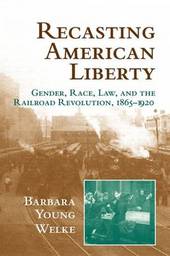
|
Recasting American Liberty: Gender, Race, Law, and the Railroad Revolution, 1865-1920
Hardback
Main Details
Description
Through courtroom dramas from 1865 to 1920, Recasting American Liberty offers a dramatic reconsideration of the critical role railroads, and their urban counterpart, streetcars, played in transforming the conditions of individual liberty at the dawn of the 20th century. The three-part narrative, focusing on the law of accidental injury, nervous shock, and racial segregation in public transit, captures Americans' journey from a cultural and legal ethos celebrating manly independence and autonomy to one that recognized and sought to protect the individual against the corporate power, modern technology and modern urban space.
Reviews"In this well-written book, Barbara Young Welke offers a thoughtful and comprehensive analysis...[her] book should appeal to scholars in many fields, especially those interested in law..." American Journal of Sociology "Welke has written a perceptive and intriguing analysis that not only sheds light on the social and communal effects of rail traffic but also provide a glimpse of the personal consequences of technological change, safety regulations, and policy decisions...This well-organized and extensively documented work considers the significance of such issues as physical and psychological injuries associated with rail traffic as well as the role that gendered policies and racial segregation played in the meaning of individual liberty in industrializing the US." Choice "[An] outstanding work of social and legal history..." Journal of Interdisciplinary History "Welke's study...is a welcome addition to the growing literature on how railroading shaped legal culture. Based upon meticulous research in legal records, it will stimulate debate and deserves a large audience." H-Net: Humanities and Social Sciences Online
|